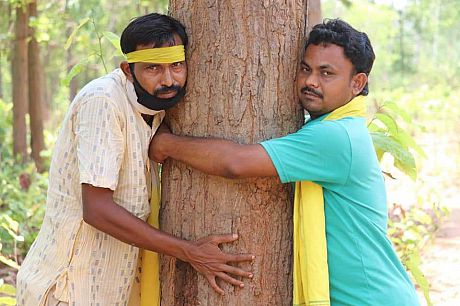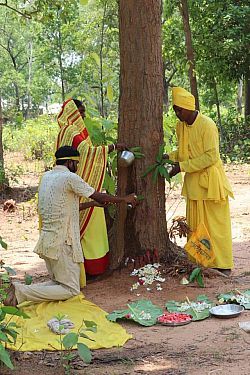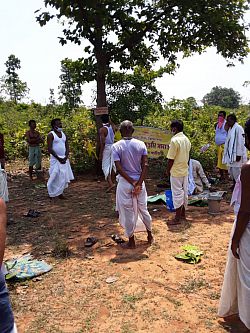CWEH Blog 26 May 2020
Nirmal Kumar Mahato
In the second week of May 2020, we received reports of local protests organised by Adivasi Kurmi Samaj against the sal (Shorea robusta) tree felling by the Forest Department during the lockdown period in the Kotsila region of Purulia District, West Bengal, India. Maintaining social distancing the villagers started their protest under the leadership of Ajit Prasad Mahato, Sadhan Mahato, Swapan Kumar Mahato, Nripen Mahato. The organisation submitted a deputation to the District Forest Officer and District Magistrate of Purulia on 12th May 2020. They argued that in the name of felling the forest department was engaged in destroying the original forest. They also argued for protecting the original forest ecology as it has wide varieties of medicinal plants. They called for a week long Jungle Jiao Hamdumi (Protest for saving the forest) from 10th -16th May 2020 through their traditional way of protest by giving water at the base of the trees and worshiping the sal tress at different sacred groves. The people also embraced the tress as a symbol of protest (Fig.1).
 Fig 1: Protesters embracing the trees, Picture: Sadhan Mahato
Fig 1: Protesters embracing the trees, Picture: Sadhan Mahato
This traditional symbolic protest spread over different parts of Jungle Mahals, Jharkhand and Orissa. Intellectuals and poets like Nirmal Halder and Badsha Maitra expressed their views against the destruction of nature and supported the assertion of adivasi rights. Sadhan Mahato, Laxman Mahato and other youth played an important part using the social media to spread the news during the lock down period.
Villagers from different villages, i.e. Dubrajpur, Chatarmahul, Mirgipahari, Ramboni, Sulibari took an oath by worshiping the sacred grove for protecting nature (Fig 2).
|
|
|
|
Fig 2: Villagers worshiping the nature, Picture: Sadhan Mahato |
Fig 3: Villagers worshiping the sacred grove as a symbol of protest, Picture: Ranjit Rajadhiraj |
Against the destruction of old forest both women and men participated in worshiping the trees in the sacred groves. Large number of women participated in this social protest (Fig 3).
The incidence of nature worship occurred at large scale in Rakab Jungle. Villagers from different blocks such as Jhalda, Jaipur, Bagmundi and Kashipur also organised nature worship as a form of social protest. The young leader Aditya Mahato commented that this protest was not only against the destruction of nature but it was their social duty to nourish nature. Purulia Khas Khobor News Channel called this social protest as ‘second Chipko movement’ as the villagers embraced the trees while protesting forest cutting.
The Adivasi Kurmi Samaj submitted their thirteen demands before the district administration. Among these, they demanded to stop cutting the sal and other forest trees. The old heritage forests of Purulia, such as, Ayodhya, Ghatban, Sugnabasa, Agajhore, Kawahara, Pandur Bahal, Jarabasa should be preserved and regenerated through plantation of indigenous plants. They also demanded the proper implementation of Forest Right Act of 2006. They also demanded that an awareness programme should be taken against hunting and forest fire. Extraction of stone from the forest should also be prohibited.
Some of the videos and pictures on protesters’ activities can be found on the following links:
- https://m.facebook.com/groups/1399321016892795?view=permalink&id=1556853474472881
- https://m.facebook.com/story.php?story_fbid=1869260859871229&id=100003619981076
- https://m.facebook.com/story.php?story_fbid=1145968152445053&id=826205781087960
- https://www.facebook.com/PuruliaKhasKhabar/videos/1072191436488143/
- https://www.facebook.com/banglarjunglemahal/videos/692451698255052/




